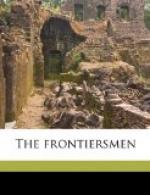“They don’t want you, my buck, or they would have been after you,” the trader used to reply, being harder, perhaps when he was younger. Besides, he honestly thought the cadaverous brat, all legs, like a growing colt, and skinny arms, was better off here in the free woodland life which he himself considered no hardship, and affected long after necessity or interest had dictated his environment. The little lad was safe in the care of the powerful chief Colannah Gigagei of Tennessee Town, who had adopted him, and who was a man of great force and influence. Why should the child seek a home among his own people, unwelcome doubtless, to eat the meagre crust of charity, or serve as an overworked drudge somewhere on the precarious frontier? The trader did not greatly deplore the lack of religious training, for in the remote settlements this was often still an unaccustomed luxury, albeit some thirty years had now gone by since Sir Francis Nicholson, then the Governor, declared that no colony could flourish without a wider diffusion of the gospel and education, and forthwith ordered spiritual drill, so to speak, in the way of preaching and schooling. Although himself described as “a profane, passionate, headstrong man, bred a soldier,” as if the last fact were an excuse for the former, he contributed largely to the furtherance of these pious objects, “spending liberally all his salary and perquisites of office,” for which generous trait of character an early and strait-laced historian is obviously of the opinion that General Nicholson should have been suffered to swear in peace and, as it were, in the odor of sanctity.
More than once, when in Charlestown, Varney, notwithstanding his persuasions on the subject, had been minded to inquire concerning the “Queetlees,” who he understood from Colannah had come originally from Cumberland in England. With his mercantile cronies he had canvassed the question whether the queer, evidently distorted name could have been “Peatley” or “Patey” or “Petrie,”—for the Cherokees always substituted “Q” for “P,” as the latter letter they could not pronounce,—and after this transient consideration the matter would drop.
As the child, running about the Indian town with his new-found playmates, grew robust and merry-hearted, and happiness, confidence, and strength brought their embellishing influence to the expression of his large dark gray eyes and straightened the nervous droop from his thin little shoulders, the trader noticed casually once or twice how comely the brat had become, and he experienced a fleeting, half-ridiculing pity for his mother—how the woman would have resented and resisted the persistent shearing and shaving of those silken, loosely twining red curls! Then he thought of her no more. But when the child had come to man’s estate, when he was encased in a network of muscle like elastic steel wires, when stature and strength had made him alike formidable and splendid, when the development of his temperament




